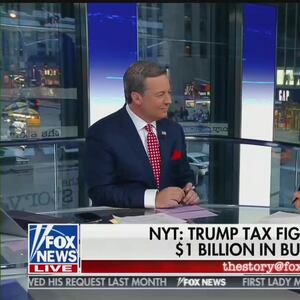The myth of Donald Trump the modern Midas who turns to gold all that he touches died Tuesday afternoon.
It was killed by brilliant investigative reporting in The New York Times. Reporters Russ Buettner and Susanne Craig obtained 11 years of detailed Internal Revenue Service records showing that Trump businesses lost $1.2 billion from 1985 through 1995.
For 11 years, every time Trump took a breath he lost more than $3.
Trump is not a wealth creator, but a wealth destroyer on a scale probably never before seen in America. Well, actually he’s at most second to the imprisoned swindler Bernie Madoff, whose investors lost at least $4.5 billion.
Unlike Trump, Madoff at least fessed up when he got caught.
The Trump tax records came from a source who legally had possession of the material, known as tax transcripts, the Times reported. There are others—bankers, employees, regulators and even family members—who have other such material. More of them may be more willing now to feed it to the Times, to me, or some other source known for understanding complex tax and financial documents.
It’s enough to keep Trump up at night, fearing that every secret he has may see the light of day. And he should fret because he has a lot to hide, as I’ve learned from following him for more than 30 years, diligence that made him nickname me “the weird dude.”
So why should you care that Trump is a financial fraud? Beyond basic questions about honesty and integrity, why should you care?
For the same reason that our government looks into the finances of people seeking security clearances. A man or woman in financial stress is just the kind of person spy agencies target. Plying people in desperate need of cash is an ancient and often very successful technique for grooming traitors.
We know that Trump and his son-in-law, Jared Kushner, have been exceptionally friendly to Russian oligarchs (aka Vladimir Putin’s criminal gang), Saudi royals, and others eager to bend American government policy in their favor. And Trump is always praising Putin, saying he takes him at his word while he dismisses the findings of U.S. intelligence agencies.
Now that we know Trump is a fake business genius, it’s also reasonable to ask what other cons he has run on the American people, especially since his administration says it will fight every effort by House Democrats to engage in oversight of the administration.
The Times exposé, brilliant in its grasp of complex accounting and tax issues and yet told in simple language, also confirms my reporting on why Trump is always trying to do a new deal instead of growing the businesses he has controlled over the years.
A typical business person tries to grow their enterprises. Not Trump. He squeezes cash out of them as fast as possible. Then he abandons them, leaving behind unpaid debts. Trump is a financial locust who flits off to find another sucker whose enterprise he can devour.
This business model, this utterly corrupt business model, works so long as Trump can find another victim. There is no shortage of Americans gullible enough to believe that Trump will make them rich even as he destroys their wealth. And because he does it with a pen, it’s almost impossible to prosecute these schemes thanks to weak laws on fraud and constrained law-enforcement resources.
We also now know another reason that Trump, unlike every president since Richard Nixon, hides his tax returns. He paid federal income taxes in only two of the 11 years. Only one year were his income taxes significant—and even that money he may have recovered in future years because of complex tax rules.
The new reporting by the Times also hints at what may be more Trump tax fraud, on which there is no statute of limitations when it is criminal rather than civil.
In 1989, when the Trump Organization was hurtling toward collapse, he reported $52.9 million of interest income. That was more than 110 times the interest income he had reported three years earlier in 1986.
The more than $1 million per week of interest for 1989 implies that Trump held more than $660 million of 30-year Treasury bonds or more than $350 million of risky junk bonds paying an eye-popping 15 percent interest.
Who paid that interest?—if it was interest. We know Trump was for years deeply entangled with a major international cocaine trafficker, has done squirrely deals with Russians that on the surface make no economic sense, among other strange financial deals. Was what Trump reported as interest actually payment for something else? If so, was it benign or sinister?
From other records we know that Trump did not have such vast holdings in bonds. The Times, always equally genteel and respectful of power, called it a mystery.
It’s a mystery that Congress has the power to investigate. It should. After all, as Richard Nixon told us, “Americans need to know that their president is not a crook.”







